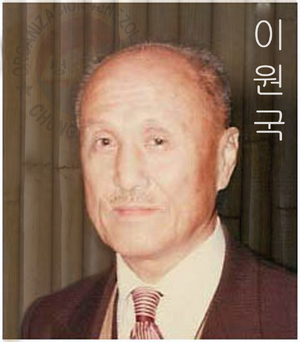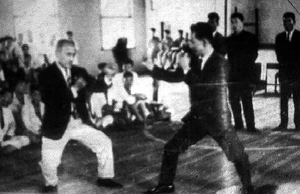
Won Kuk Lee

Won Kuk Lee and Woon Kyu Um face each other at the Korean Taekwondo Association dojang in the 1960s
LEE, Won-kuk was the founder of Chung Do Kwan, one of the original Nine Kwans of taekwondo. He is also the author of the book Tae Kwon Do Handbook (1968).
Biography[]
Lee (Hangul: 이원국, Hanja: 李元國) (April 13, 1907 – February 2, 2002) was a pupil of karate pioneer Gichin Funakoshi. Some sources note that Lee may have actually been the first Korean student of Japanese karate.
Lee moved to Tokyo in 1926 to attend high school. He subsequently majored in law at Chuo University. At Chuo, Lee studied Shotokan karate under Funakoshi and his son Yoshitaka (Gigo). Since the Chuo University dojo was founded after 1928 but before 1935, this suggests that Lee began studying karate in the early 1930s.
After returning to Korea in 1944, Lee received permission from the Japanese occupying government to teach karate, first to Japanese nationals and later to a select club of Koreans at the Yungshin School gymnasium in Seoul. Lee created his own style of karate known as Tang Soo Do ("the way of the Chinese hand”) and named his club Chungdohwe ("blue wave association"), later renamed to the Chung Do Kwan ("blue wave school"). The phrase Tang Soo Do was the Korean pronunciation of Funakoshi's word “Karate-Do” used during the decade of the 1920s, based on the the Chinese character tang (唐).
During the highest peak of the Chung Do Kwan School, it gathered more than 50,00 participants. During the decade of the 1940s and the beginning of the 1950s, its trainings and teachings were considered the best and the most authentic.
In 1947, the head of Korea’s national police, Yun Cae, approached Lee with an offer from the Republic of Korea’s (ROK) President Syngman Rhee. If Lee could convince his entire 5,000-member kwan to join Rhee’s political party (often described as authoritarian), Lee would be appointed Minister of Internal Affairs. Lee refused. Lee was immediately accused of being pro-Japanese and the leader of an assassin group. This is ironic because, according to the noted Korean scholar Lee Jeong-kyu, “during the 12 years of Syngman Rhee’s administration (1948-1960), 83% of 115 cabinet ministers were Japanese agents or collaborators under Japanese colonial rule”. Soon after, Lee, his wife, and several of his top students were arrested.
After his release in 1950, Lee continued to feel threatened by the political climate, so he relocated to Japan. His absence, combined with the Korean War, led to some of his senior students establishing their own kwans. These included Hwang Kee (Moo Duk Kwan); Son Duk Sung (Chung Do Kwan); Kang Suh Chang (Kuk Moo Kwan); Choi Hong Hi (Oh Do Kwan); Lee Yong Woo (Jung Do Kwan); and Ko Jae Chun (Chung Ryong Kwan).
In 1951, Won Kuk Lee retired from teaching and left the leadership of the school to Duk Sung Son. In the following years, Lee would visit his old students, who were recognized later as “Masters,” and acted as judge in tournaments, belt test promotions and other events.
In 1976 Lee immigrated to the USA with his wife and settled in Arlington, Virginia, living around Washington DC the remainder of his life where he dedicated his time to the practice of calligraphy, acupuncture and giving interviews occasionally. He died from pneumonia in the Hospital of Arlington in Virginia close to his 95th birthday, on February 2, 2003. The eulogy at his funeral was read by one of his student, Yong Taek Chung.
References[]
- Won Kuk Lee on Wikipedia
- http://kimsacta.com/tkd/tkd.html
- http://www.kidokwan.org/articles/the-evolution-of-taekwondo-from-japanese-karate/
| This page uses Creative Commons Licensed content from Wikipedia (view authors). |